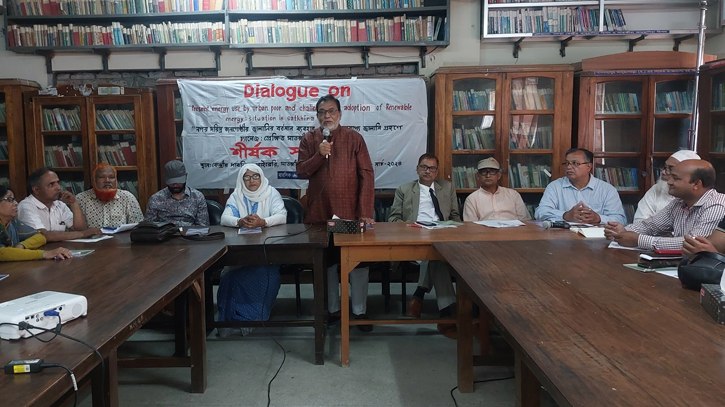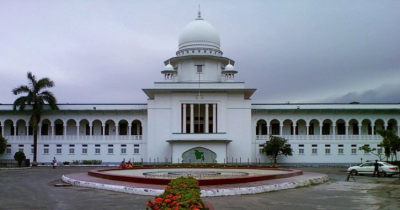
Photo : Messenger
94 percent of the urban poor in Satkhira are not familiar with 'renewable energy'. About 16 percent of the monthly income of these families is spent on electricity and cooking expenses. The average cost of this family per month is about 2 thousand 372 taka. Out of this, the average cost of electricity is 1 thousand 144 taka. And the cost of cooking is 1227 taka.
This information was revealed in a dialogue titled ‘Present energy use by urban poor and challenges for adoption of Renewable Energy: Situation in Satkhira town’ organized by research organization Bangladesh Resources Center for Indigenous Knowledge (BARCIK) at Satkhira Central Public Library auditorium on Monday (March 24).
In the dialogue project director Kamruzzaman Sagar presented the results of the research on the use of energy by urban poor people of Satkhira.
BARCIK recently conducted this study on the use of energy by the urban poor and the challenges faced by the poor in using renewable energy in the capital city Dhaka, the divisional city Rajshahi and the district city Satkhira.
According to the research results, Urban poor use different types of fuel depending on availability. In this case, 95 percent of families among the urban poor in Satkhira use wood for cooking. 58 percent households are using tree leaves, 40 percent households are using gas cylinders, 32 percent households are using plastic/polythene. In the last two years, 5 percent of urban poor households have had an accident. Accidents occurred from cooking sticks. 26 percent of household members had a severe cough in the past six months due to cooking fumes. Most notably, 94 percent of respondents said they were not familiar with the term 'renewable energy' during data collection. In addition, about 3 percent of urban poor families in Satkhira city said that they use solar panels.
According to the dialogue, the Mujib Climate Prosperity Plan calls for 30 percent renewable energy use by 2030 and at least 40 percent by 2041. The government has set a target of 100% clean cookstoves by 2030. But the poor people of the city have no idea about it. This target cannot be achieved by excluding the urban poor.
The study recommends that local governments and other organizations should take initiatives to increase the use of renewable energy/fuel to implement the Mujib Climate Prosperity Plan pledges, address climate change risks and control pollution. Encouraging the use of renewable energy, taking initiatives and making policies inclusive in this regard will improve the quality of life of the urban poor, reduce energy costs and improve the environment. There is lack of proper information and awareness among people about renewable energy. So public awareness should be increased. The related government institutions and private institutions have to undertake various publicity initiatives. In urban poor areas needs must be determined locally. According to the capacity and needs of the urban poor, various packages can be taken up for sale at low prices with government and private subsidies.
Md. Nazrul Islam Chairman of Satkhira Zila Parishad and General Secretary of District Awami League was present as the chief guest where Azad Hosen Belal convenor of Satkhira District Citizen Committee presided over the dialogue.
Satkhira Sadar Upazila Chairman (Acting) Kohinur Islam, Environment activist Principal Asek-e-Elahi, politician Harun-ur-Rashid, politician Ali Noor Khan Babul, Civil society leader Pabitro Mohon Das and Abdus Samad, development activist Madhab Chandra Dutto, cultural activist Siddikur Rahaman, politician Edris Ali, Satkhira Municipal Councilor Maruf Hosen and Anima Rani, BARCIK officer Zahangir Alom, among others, spoke at the dialogue.
Messenger/Sumon








